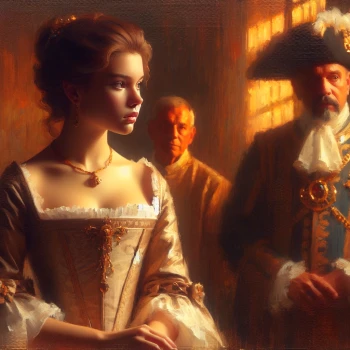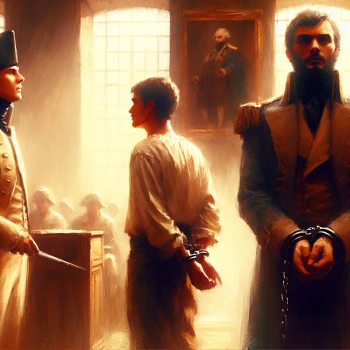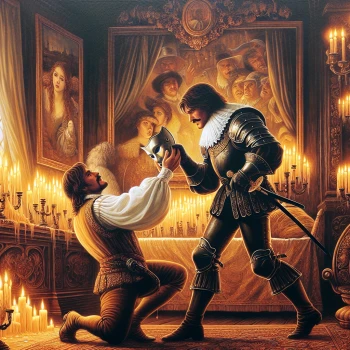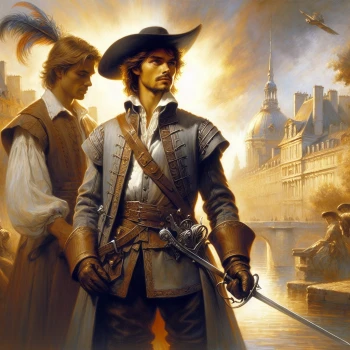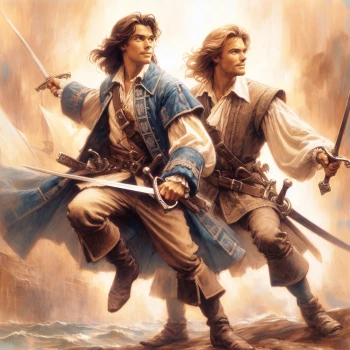
Alexandre Dumas
Alexandre Dumas, a French author born into Russian aristocracy, is best known for his historical adventure novels, including 'The Three Musketeers'. His works, deeply philosophical and critical of social norms and class structures, reflect his Christian anarchist worldview.
Notable Works
Alexandre Dumas is best known for his historical adventures such as 'The Three Musketeers' and 'Twenty Years After'. These works, part of the D'Artagnan Romances, are characterized by their vivid and engaging exploration of friendship, loyalty, and political intrigue during the reign of Louis XIII of France. Dumas' mastery of the historical fiction genre shines through in his intricate plots and well-researched settings, deeply immersing readers in the tumultuous period of the 17th century.
Dumas' characters, particularly the brave and impulsive d'Artagnan and the enigmatic Cardinal Richelieu, have left an indelible mark on literature. His works continue to captivate readers with their blend of adventure, camaraderie, and the struggle for justice against a backdrop of political instability.
Books by Alexandre Dumas
Overview & Analysis
Alexandre Dumas, born into the Russian aristocracy, was a renowned French author whose works have become a staple in world literature. His narratives, deeply rooted in the political and social contexts of the 19th century, often revolve around themes of justice, honor, and morality. Dumas was a philosophical thinker, expressing his Christian anarchist worldview and pacifist leanings through his character-driven tales. His critique of social norms and class structures is evident in his works, reflecting his belief in a society governed by Christian ethics rather than institutional laws. Most notably, his series of books featuring d'Artagnan and the Three Musketeers - 'The Three Musketeers', 'Twenty Years After', and the 'Ten Years Later' trilogy - have captivated readers with their tales of adventure and camaraderie. Dumas' focus on internal moral evolution, his rich, complex characters, and his vivid depictions of historical events like the reign of Louis XIII and the Siege of La Rochelle have left an indelible mark on literature.
Back to TopInfluences & Worldview
Alexandre Dumas, deeply influenced by the political and social turmoil of the mid-19th century, was a distinctive philosophical thinker who regularly incorporated themes of justice, honor, and morality into his narrative. He often critiqued class structures and social norms, expressing his views through character-driven narratives. This approach, coupled with his Christian anarchist leanings, reflects his belief in a society governed by Christian ethics rather than institutional law. Dumas was also a pacifist, opposing war and violence as a means of conflict resolution, a theme that surfaces in his works. His emphasis on internal moral evolution illustrates his belief in the potential of individuals to change and grow. Despite being born into the Russian aristocracy, Dumas was critical of social hierarchies and was known to challenge the system from within.
Relevant Historical Events
- Reign of Louis XIII (1610 – 1643): The reign of Louis XIII was marked by political centralization, religious conflicts, and extensive military campaigns. Notably influenced by Cardinal Richelieu, the period saw a strengthening of royal authority and attempts to diminish noble power.
- Thirty Years' War (1618 – 1648): A devastating European conflict primarily fought on German territory, involving major European powers. It began as a religious struggle between Catholics and Protestants but evolved into a broader political conflict.
- Siege of La Rochelle (1627 – 1628): A significant military conflict during Louis XIII's reign, the Siege of La Rochelle was a key event in the French Wars of Religion, pitting royal Catholic forces against Huguenot rebels. Cardinal Richelieu played a critical role in orchestrating the successful siege.
Notable Characters
Alexandre Dumas is renowned for his creation of characters that are as complex as they are memorable. His characters tend to be individuals of strong will, moral complexity, and often trapped in circumstances beyond their control. For instance, d'Artagnan, the ambitious and loyal protagonist in 'The Three Musketeers', embodies the spirit of adventure and camaraderie. He, along with Athos, portrays the theme of friendship and bravery, against the backdrop of political upheaval.
Another significant character is Cardinal Richelieu, who, despite being a villain, is a deeply complex character representing the intricate power dynamics of the time. Milady de Winter, a character of cunning and villainy, is a testament to Dumas' ability to create powerful female characters who defy the societal norms of the era.
Dumas' characters often reflect the tumultuous historical period he wrote in, particularly the religious conflicts and political intrigue of the reign of Louis XIII. These characters, with their intertwined personal ambitions and the larger socio-political context, embody Dumas' intricate storytelling and his exploration of themes such as power, loyalty, and ambition.
Back to TopThemes of Focus
Alexandre Dumas, one of the most celebrated authors in French literature, consistently explores themes of adventure, loyalty, and the power dynamics of political intrigue in his works. His most famous series, The Three Musketeers and its sequels, epitomize these themes. His characters navigate grand adventures and demonstrate unyielding loyalty to each other, even in the face of seemingly insurmountable odds.
The author's fascination with political power dynamics is evident in the way he portrays Cardinal Richelieu, a character based on a real historical figure who held significant sway during the reign of Louis XIII. This character, often placed in opposition to the protagonists, reflects the power struggles and political tensions of the time.
Secondary themes in Dumas' works include betrayal and redemption, often intertwined with the main themes. Characters such as Milady de Winter embody these themes, adding layers of complexity to the narrative. Dumas' themes are deeply influenced by the historical events of his time, particularly the reign of Louis XIII and the Thirty Years' War, embedding his works with an authentic historical context that enriches the adventure and intrigue.
Back to TopLegacy & Impact
Alexandre Dumas has left an indelible mark on literature and society with his adventure novels, notably The Three Musketeers, and their themes of justice, honor, and morality. His works are celebrated for their stirring narratives, vivid characterization, and social commentary, particularly on class structures and societal norms. Dumas, a philosophical thinker and critic of the established system, infused his writings with his Christian anarchist worldview, advocating for a society driven by Christian ethics rather than institutional law.
His characters, such as d'Artagnan and Cardinal Richelieu, continue to intrigue readers and scholars alike, embodying complex moral dilemmas and human struggles. These timeless narratives have ensured the lasting relevance of his works, which are studied in schools and universities around the world. Adaptations of his novels in film, television, and theatre testify to their enduring appeal.
Dumas' legacy, however, is not without controversy. His critique of social hierarchies and his pacifist stance have often been challenged, sparking debates on his ideological positions. Despite these controversies, Alexandre Dumas remains an influential figure in literature, his works a testament to his profound understanding of human nature and societal dynamics.
Back to TopConclusion
Alexandre Dumas' works continue to resonate in the modern era due to their universal themes of justice, honor, and morality. His unique worldview, which critically examined class structures and social norms, was a significant catalyst in shaping literary traditions. Dumas skillfully integrated his philosophical thought and Christian anarchist leanings into captivating narratives, providing a critical examination of societal constructs through memorable characters and their journeys. His pacifist stance and belief in internal moral evolution further enriched his narratives, making them timeless pieces of literature. Readers should continue to explore Dumas' stories not just for their historical and cultural significance, but also for the depth and nuance they offer in understanding human nature and societal dynamics. His works serve as a compelling reminder of the power of literature to reflect, critique, and inspire change in society.
Back to Top